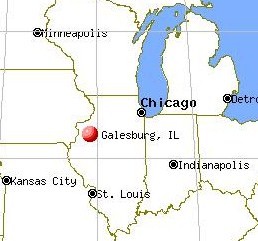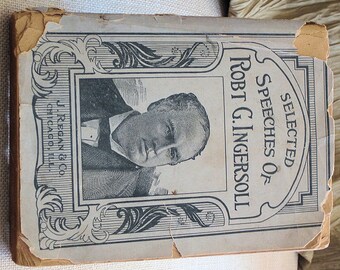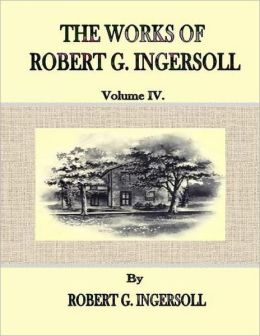
Robert G. Ingersoll
AN ADDRESS TO THE COLORED PEOPLE
From the Works of Robert G. Ingersoll, "An Address to the Colored People," delivered to the colored people at Galesburg, Illinois, 1867 -- FELLOW-CITIZENS—Slavery has in a thousand forms existed in all ages, and among all people. It is as old as theft and robbery.
Every nation has enslaved its own people, and sold its own flesh and blood. Most of the white race are in slavery to-day. It has often been said that any man who ought to be free, will be. The men who say this should remember that their own ancestors were once cringing, frightened, helpless slaves.
When they became sufficiently educated to cease enslaving their own people, they then enslaved the first race they could conquer. If they differed in religion, they enslaved them. If they differed in color, that was sufficient. If they differed even in language, it was enough. If they were captured, they then pretended that having spared their lives, they had the right to enslave them. This argument was worthless. If they were captured, then there was no necessity for killing them. If there was no necessity for killing them, then they had no right to kill them. If they had no right to kill them, then they had no right to enslave them under the pretence that they had saved their lives.

Galesburg, Illinois
Every excuse that the ingenuity of avarice could devise was believed to be a complete justification, and the great argument of slaveholders in all countries has been that slavery is a divine institution, and thus stealing human beings has always been fortified with a "Thus saith the Lord."
Slavery has been upheld by law and religion in every country. The word Liberty is not in any creed in the world. Slavery is right according to the law of man, shouted the judge. It is right according to the law of God, shouted the priest. Thus sustained by what they were pleased to call the law of God and man, slaveholders never voluntarily freed the slaves, with the exception of the Quakers. The institution has in all ages been clung to with the tenacity of death; clung to until it sapped and destroyed the foundations of society; clung to until all law became violence; clung to until virtue was a thing only of history; clung to until industry folded its arms—until commerce reefed every sail—until the fields were desolate and the cities silent, except where the poor free asked for bread, and the slave for mercy; clung to until the slave forging the sword of civil war from his fetters drenched the land in the master's blood. Civil war has been the great liberator of the world.
Slavery has destroyed every nation that has gone down to death. It caused the last vestige of Grecian civilization to disappear forever, and it caused Rome to fall with a crash that shook the world. After the disappearance of slavery in its grossest forms in Europe, Gonzales pointed out to his countrymen, the Portuguese, the immense profits that they could make by stealing Africans, and thus commenced the modern slave-trade—that aggregation of all horror—that infinite of all cruelty, prosecuted only by demons, and defended only by fiends. And yet the slave-trade has been defended and sustained by every civilized nation, and by each and all has been baptized "Legitimate commerce," in the name of the Father, the Son and the Holy Ghost:
It was even justified upon the ground that it tended to Christianize the negro.
It was of the poor hypocrites who had used this argument that Whittier said,
"They bade the slaveship speed from coast to coast, Fanned by the wings of the Holy Ghost."
Backed and supported by such Christian and humane arguments slavery was planted upon our soil in 1620, and from that day to this it has been the cause of all our woes, of all the bloodshed—of all the heart-burnings—hatred and horrors of more than two hundred years, and yet we hated to part with the beloved institution. Like Pharaoh we would not let the people go. He was afflicted with vermin, with frogs—with water turned to blood—with several kinds of lice, and yet would not let the people go. We were afflicted with worse than all these combined—the Northern Democracy—before we became grand enough to say, "Slavery shall be eradicated from the soil of the Republic." When we reached this sublime moral height we were successful. The Rebellion was crushed and liberty established.
A majority of the civilized world is for freedom—nearly all the Christian denominations are for liberty. The world has changed—the people are nobler, better and purer than ever.
Every great movement must be led by heroic and self-sacrificing pioneers. In England, in Christian England, the soul of the abolition cause was Thomas Clarkson. To the great cause of human freedom he devoted his life. He won over the eloquent and glorious Wilberforce, the great Pitt, the magnificent orator, Burke, and that far-seeing and humane statesman, Charles James Fox.
In 1788 a resolution was introduced in the House of Commons declaring that the slave trade ought to be abolished. It was defeated. Learned lords opposed it. They said that too much capital was invested by British merchants in the slave-trade. That if it were abolished the ships would rot at the wharves, and that English commerce would be swept from the seas. Sanctified Bishops—lords spiritual—thought the scheme fanatical, and various resolutions to the same effect were defeated.
The struggle lasted twenty years, and yet during all those years in which England refused to abolish the hellish trade, that nation had the impudence to send missionaries all over the world to make converts to a religion that in their opinion, at least, allowed man to steal his brother man—that allowed one Christian to rob another of his wife, his child, and of that greatest of all blessings—his liberty. It was not until the year 1808 that England was grand and just enough to abolish the slave-trade, and not until 1833 that slavery was abolished in all her colonies.
The name of Thomas Clarkson should be remembered and honored through all coming time by every black man, and by every white man who loves liberty and hates cruelty and injustice.
Clarkson, Wilberforce, Pitt, Fox, Burke, were the Titans that swept the accursed slaver from that highway—the sea.
In St. Domingo the pioneers were Oge and Chevannes; they headed a revolt; they were unsuccessful, but they roused the slaves to resistance. They were captured, tried, condemned and executed. They were made to ask forgiveness of God, and of the King, for having attempted to give freedom to their own flesh and blood. They were broken alive on the wheel, and left to die of hunger and pain. The blood of these martyrs became the seed of liberty; and afterward in the midnight assault, in the massacre and pillage, the infuriated slaves shouted their names as their battle-cry, until Toussaint, the greatest of the blacks, gave freedom to them all.
In the United States, among the Revolutionary fathers, such men as John Adams, and his son John Quincy—such men as Franklin and John Jay were opposed to the institution of slavery. Thomas Jefferson said, speaking of the slaves, "When the measure of their tears shall be full—when their groans shall have involved heaven itself in darkness—doubtless a God of justice will awaken to their distress, and by diffusing light and liberality among their oppressors, or at length by his exterminating thunder manifest his attention to the things of this world, and that they are not left to the guidance of a blind fatality."

Thomas Paine said, "No man can be happy surrounded by those whose happiness he has destroyed." And a more self-evident proposition was never uttered.
These and many more Revolutionary heroes were opposed to slavery and did what they could to prevent the establishment and spread of this most wicked and terrible of all institutions.
You owe gratitude to those who were for liberty as a principle and not from mere necessity. You should remember with more than gratitude that firm, consistent and faithful friend of your downtrodden race, Wm. Lloyd Garrison. He has devoted his life to your cause. Many years ago in Boston he commenced the publication of a paper devoted to liberty. Poor and despised—friendless and almost alone, he persevered in that grandest and holiest of all possible undertakings. He never stopped, or stayed, or paused until the chain was broken and the last slave could lift his toil-worn face to heaven with the light of freedom shining down upon him, and say, I am a Free Man.
You should not forget that noble philanthropist, Wendell Phillips, and your most learned and eloquent defender, Charles Sumner.

But the real pioneer in America was old John Brown. Moved not by prejudice, not by love of his blood, or his color, but by an infinite love of Liberty, of Right, of Justice, almost single-handed, he attacked the monster, with thirty million people against him. His head was wrong. He miscalculated his forces; but his heart was right. He struck the sublimest blow of the age for freedom. It was said of him that, he stepped from the gallows to the throne of God. It was said that he had made the scaffold to Liberty what Christ had made the cross to Christianity. The sublime Victor Hugo declared that John Brown was greater than Washington, and that his name would live forever.
I say, that no man can be greater than the man who bravely and heroically sacrifices his life for the good of others. No man can be greater than the one who meets death face to face, and yet will not shrink from what he believes to be his highest duty. If the black people want a patron saint, let them take the brave old John Brown. And as the gentleman who preceded me said, at all your meetings, never separate until you have sung the grand song,
"John Brown's body lies mouldering in the grave,
But his soul goes marching on."
You do not, in my opinion, owe a great debt of gratitude to many of the white people.
Only a few years ago both parties agreed to carry out the Fugitive Slave Law. If a woman ninety-nine one-hundredths white had fled from slavery—had traveled through forests, crossed rivers, and through countless sufferings had got within one step of Canada—of free soil—with the light of the North Star shining in her eyes, and her babe pressed to her withered breast, both parties agreed to clutch her and hand her back to the dominion of the hound and lash. Both parties, as parties, were willing to do this when the Rebellion commenced.
The truth is, we had to give you your liberty. There came a time in the history of the war when, defeated at the ballot box and in the field—driven to the shattered gates of eternal chaos—we were forced to make you free; and on the first day of January, 1863, the justice so long delayed was done, and four millions of people were lifted from the condition of beasts of burden to the sublime heights of freedom. Lincoln, the immortal, issued, and the men of the North sustained the great proclamation.
As in the war there came a time when we were forced to make you free, so in the history of reconstruction came a time when we were forced to make you citizens; when we were forced to say that you should vote, and that you should have and exercise all the rights that we claim for ourselves.

And to-day I am in favor of giving you every right that I claim for myself.
In reconstructing the Southern States, we could take our choice, either give the ballot to the negro, or allow the rebels to rule. We preferred loyal blacks to disloyal whites, because we believed liberty safer in the hands of its friends than in those of its foes.
We must be for freedom everywhere. Freedom is progress—slavery is desolation, cruelty and want.
Freedom invents—slavery forgets. The problem of the slave is to do the least work in the longest space of time. The problem of free men is to do the greatest amount of work in the shortest space of time. The free man, working for wife and children, gets his head and his hands in partnership.
Freedom has invented every useful machine, from the lowest to the highest, from the simplest to the most complex. Freedom believes in education—the salvation of slavery is ignorance.

The South always dreaded the alphabet. They looked upon each letter as an abolitionist, and well they might. With a scent keener than their own bloodhounds they detected everything that could, directly or indirectly, interfere with slavery. They knew that when slaves begin to think, masters begin to tremble. They knew that free thought would destroy them; that discussion could not be endured; that a free press would liberate every slave; and so they mobbed free thought, and put an end to free discussion and abolished a free press, and in fact did all the mean and infamous things they could, that slavery might live, and that liberty might perish from among men.
You are now citizens of many of the States, and in time you will be of all. I am astonished when I think how long it took to abolish the slave-trade, how long it took to abolish slavery in this country. I am also astonished to think that a few years ago magnificent steamers went down the Mississippi freighted with your fathers, mothers, brothers, and sisters, and maybe some of you, bound like criminals, separated from wives, from husbands, every human feeling laughed at and outraged, sold like beasts, carried away from homes to work for another, receiving for pay only the marks of the lash upon the naked back. I am astonished at these things. I hate to think that all this was done under the Constitution of the United States, under the flag of my country, under the wings of the eagle.
The flag was not then what it is now. It was a mere rag in comparison. The eagle was a buzzard, and the Constitution sanctioned the greatest crime of the world.
I wonder that you—the black people—have forgotten all this. I wonder that you ask a white man to address you on this occasion, when the history of your connection with the white race is written in your blood and tears—is still upon your flesh, put there by the branding-iron and the lash.
I feel like asking your forgiveness for the wrongs that my race has inflicted upon yours. If, in the future, the wheel of fortune should take a turn, and you should in any country have white men in your power, I pray you not to execute the villainy we have taught you.
One word in conclusion. You have your liberty—use it to benefit your race. Educate yourselves, educate your children, send teachers to the South. Let your brethren there be educated. Let them know something of art and science. Improve yourselves, stand by each other, and above all be in favor of liberty the world over.

The time is coming when you will be' allowed to be good and useful citizens of the Great Republic. This is your country as much as it is mine. You have the same rights here that I have—the same interest that I have. The avenues of distinction will be open to you and your children. Great advances have been made. The rebels are now opposed to slavery—the Democratic party is opposed to slavery, as they say. There is going to be no war of races. Both parties want your votes in the South, and there will be just enough negroes without principle to join the rebels to make them think they will get more, and so the rebels will treat the negroes well. And the Republicans will be sure to treat them well in order to prevent any more joining the rebels.
The great problem is solved. Liberty has solved it—and there will be no more slavery. On the old flag, on every fold and on every star will be liberty for all, equality before the law. The grand people are marching forward, and they will not pause until the earth is without a chain, and without a throne. (source: Works of Robert G. Ingersoll)






I enjoy, lead to I discovered exactly what I was having
ReplyDeletea look for. You've ended my four day long hunt! God Bless you man. Have a great day. Bye
my web blog :: Candy Crush Saga Hack